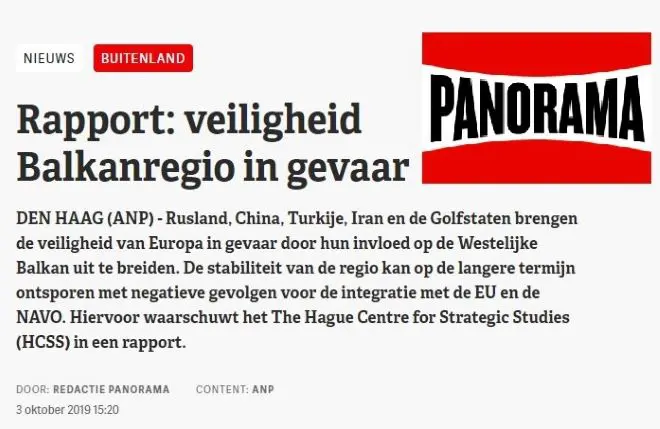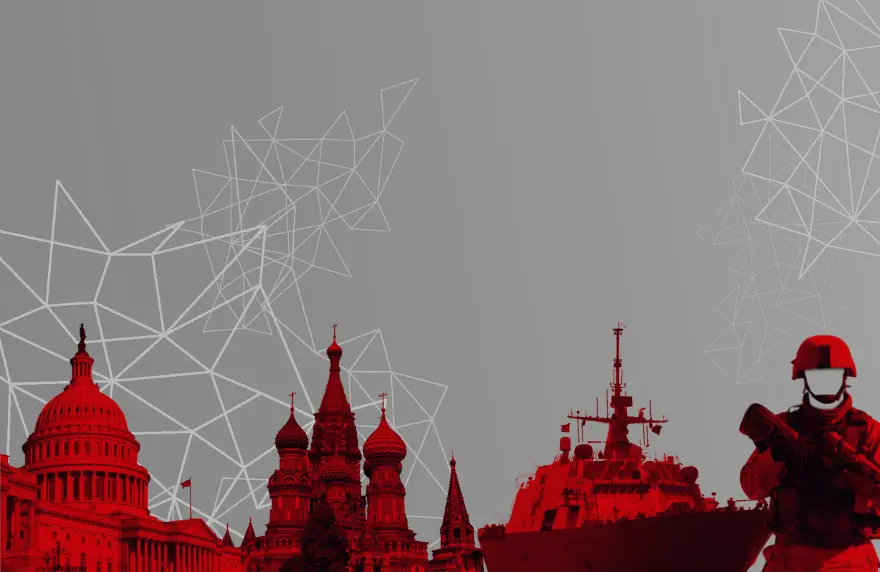Rusland, China, Turkije, Iran en de Golfstaten brengen de veiligheid van Europa in gevaar door hun invloed op de Westelijke Balkan uit te breiden. De stabiliteit van de regio kan op de langere termijn ontsporen met negatieve gevolgen voor de integratie met de EU en de NAVO. Hiervoor waarschuwt The Hague Centre for Strategic Studies (HCSS), zo schrijft Panorama deze week in een artikel over het nieuwste rapport van HCSS, “Geopolitical Influences of External Powers in the Western Balkans“.
De EU moet snel een antwoord bedenken om verdere instabiliteit in de regio te voorkomen, zeggen de onderzoekers. Ze pleiten onder meer het openen van toetredingsonderhandelingen voor Noord-Macedonië en Albanië met de EU. Bosnië en Herzegovina zou een kandidaatstatus moeten krijgen.
Het rapport spreekt van “hybride” bedreigingen vanuit Rusland, dat met een “desinformatie-oorlogsvoering” en geheime operaties de bevolking voor zich probeert te winnen, het verspreiden van gewelddadig extremisme (Golflanden) en de opbouw van een grote schuldenberg in sommige Westelijke Balkanlanden (China). Ook zijn er schendingen van EU-wetgeving inzake wapenhandel (Golflanden) en een “identiteitsherstructurering” (Golflanden, Iran, Rusland, Turkije) via onder meer de islam om hun geopolitieke belangen in de regio uit te breiden.
Coherente strategie ontbreekt
De onderzoekers geven als voorbeeld een geval in Noord-Macedonië, waar imams met Saudische steun vier moskeeën in Skopje overnamen. Voorbeelden bestaan ook in Bosnië en Herzegovina, vanwaaruit een onbekend aantal imams naar Saudi-Arabië is gereisd voor religieus onderwijs en terugkeerden als predikers van de Wahhabistische ideologie. “Tussen het einde van de oorlog en 2008 werd meer dan 700 miljoen dollar naar Bosnië en Herzegovina gesluisd via Saudi-Arabië en aan Saudi-Arabië verbonden liefdadigheidsinstellingen, voornamelijk bedoeld voor moskeeën.
Tegelijkertijd zijn lokale elites minder bereid om met het Westen, met name de EU, om te gaan, omdat ze volgens de onderzoekers niet staan te springen om de rechtsstaat naar Europees model te hervormen. “Bovendien is er terughoudendheid om met de EU in contact te treden, omdat dit tijdrovend en ingewikkeld is, bijvoorbeeld waar het gaat om het verkrijgen van subsidies.”
Verder ontbreekt het aan een coherente westerse strategie, is de wederopbouw na de oorlog uitgebleven en heeft het gebrek aan betrokkenheid bij de lokale bevolking tot wijdverspreide desillusie geleid. “Daarom lijkt betrokkenheid met niet-westerse partners vaak aantrekkelijker.”
Dit artikel verscheen op 3 oktober in Panorama.
Het rapport is hier te downloaden.







